Are you curious about the nutritional value of Quest Bars? In this article, we’ll delve into the details and uncover all the information you need to know to maintain your health while satisfying your flavor cravings!
- Quest Bars contain highly processed ingredients and three high-intensity sweeteners, which may lead to cravings for more sweets.
- The high fiber content in Quest Bars could cause bloating for some individuals.
- Nutrition experts do not recommend Quest Bars as a replacement for whole food, home-cooked meals.
- Consider opting for more whole-food-based protein bar options recommended by nutrition experts.
- Quest Bars are available in a variety of flavors and forms, such as mini bars, chips, cookies, and shakes.
- The Kirkland brand at Costco offers a cheaper alternative to Quest Bars with similar nutritional profiles.
- Ultimately, it’s important to make an informed decision and choose a protein bar that suits your individual preferences and needs.
Understanding Quest Bar Nutrition Facts
Let’s start by taking a closer look at the nutrition facts of Quest Bars to better understand their impact on your health and well-being. Quest bars are a popular protein bar option known for their wide range of flavors and convenient grab-and-go format. However, it’s important to examine their nutritional content to make an informed decision.
The nutrition facts of Quest Bars vary slightly depending on the flavor, but the general profile consists of around 200-210 calories per bar, with approximately 20 grams of protein, 9-10 grams of fat, and 4-6 grams of net carbs. They are also relatively low in sugar, typically containing less than 1 gram per bar.
One notable aspect of Quest Bars is their high fiber content. With an average of 14 grams of fiber per bar, they provide a significant amount of your daily recommended intake. Fiber is essential for digestive health, promoting regular bowel movements, and helping to keep you feeling full and satisfied.
| Nutrient | Amount Per Serving |
|---|---|
| Calories | 200-210 |
| Protein | 20g |
| Fat | 9-10g |
| Net Carbs | 4-6g |
| Sugar | Less than 1g |
| Fiber | 14g |
Quest Bars are a convenient option for those looking to boost their protein intake or satisfy a sweet tooth, but it’s important to consider them as a supplement rather than a replacement for whole foods. While they can be a convenient snack or meal replacement in certain situations, nutrition experts generally recommend prioritizing whole-food-based options for optimal health and well-being.
When selecting protein bars, it’s crucial to assess your individual needs and preferences. Some people may prefer the taste and texture of Quest Bars, while others may opt for alternatives with fewer artificial ingredients or a different macronutrient profile. Ultimately, choosing a protein bar that aligns with your goals and dietary preferences is key.
Remember, finding your favorite protein bar is a personal journey. Quest Bars may be one option, but there are plenty of other brands and flavors available to explore. Consider trying different options until you find the one that brings you satisfaction and supports your overall health and fitness goals.
Quest Bar Calories: What You Need to Know
Calorie intake plays a crucial role in maintaining a healthy lifestyle, so let’s dive into the calorie count of Quest Bars and how it fits into your overall nutrition plan. Quest Bars are known for their delicious taste and high protein content, but it’s important to be mindful of their calorie content as well.
On average, a typical Quest Bar contains around 200-220 calories. This can vary slightly depending on the flavor and size of the bar. While this calorie count may seem reasonable, it’s essential to consider it in the context of your overall daily calorie intake.
For individuals on a weight loss journey or looking to maintain their current weight, Quest Bars can be a convenient and satisfying snack option. However, it’s crucial to monitor your overall calorie intake and make sure the calories from the Quest Bars fit into your daily goals.
Quest Bar Calories per Flavor:
| Flavor | Calories |
|---|---|
| Chocolate Chip Cookie Dough | 200 |
| Double Chocolate Chunk | 210 |
| Cookies & Cream | 190 |
| Mint Chocolate Chunk | 200 |
It’s important to note that while Quest Bars can be a convenient option for those on the go or looking for a quick source of protein, they should not be relied upon as a replacement for whole, nutritious meals. Including a variety of whole foods in your diet is essential for optimal health.
If you’re considering Quest Bars as part of your nutrition plan, it’s always a good idea to consult with a registered dietitian or nutritionist. They can provide personalized guidance based on your specific needs and goals, as well as help you make informed decisions about your protein bar choices.
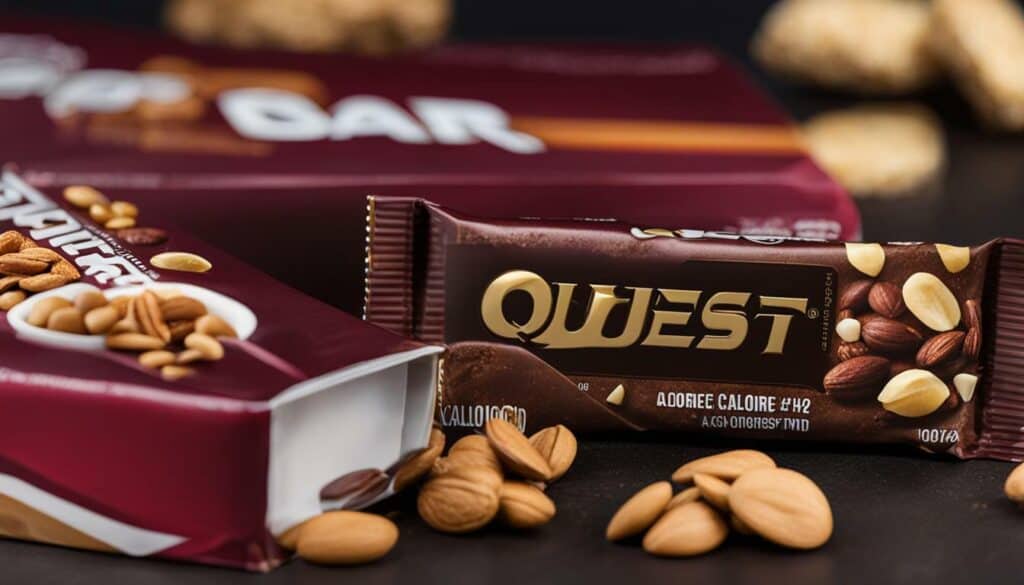
Remember, there are many protein bar options available in the market, and finding your favorite protein bar may require some trial and error. Explore different brands, flavors, and ingredients to find one that aligns with your taste preferences and nutritional needs.
Unveiling the Quest Bar Ingredients
Curious about what goes into making a Quest Bar? Let’s uncover the ingredients used and gain insight into their nutritional value.
Quest Bars are known for their delicious taste and convenient protein-packed goodness. However, it’s important to take a closer look at the ingredients to understand what makes up these popular protein bars.
The ingredients used in Quest Bars include a combination of high-quality protein sources like whey protein isolate and milk protein isolate. These protein sources help support muscle growth and repair, making them an excellent option for fitness enthusiasts and athletes.
| Quest Bar Ingredients | Nutritional Value |
|---|---|
| Protein Isolate Blend (Whey Protein Isolate, Milk Protein Isolate) | Provides a high-quality source of protein for muscle repair and growth. |
| Isomalto-Oligosaccharides (Prebiotic Fiber) | Contributes to the high fiber content of Quest Bars, promoting digestive health and satiety. |
| Almonds, Peanuts, Cashews, or Other Nuts | Offer a source of healthy fats and contribute to the texture and flavor of Quest Bars. |
| Water, Erythritol, Natural Flavors | Contribute to the taste and texture of Quest Bars without adding excessive calories or sugar. |
| Palm Kernel Oil | Provides a source of healthy fats and helps enhance the texture of Quest Bars. |
| Sea Salt, Steviol Glycosides (Stevia) | Enhances the flavor of Quest Bars without adding excessive sodium or artificial sweeteners. |
| Sucralose | A low-calorie artificial sweetener used to enhance the sweetness of Quest Bars. |
With these ingredients, Quest Bars offer a convenient and portable snack option that is high in protein and fiber, making them suitable for those looking to meet their nutritional needs on the go. However, it’s important to note that Quest Bars are highly processed and contain artificial sweeteners like sucralose. Some nutrition experts raise concerns about the potential impact of these ingredients on cravings for more sweets and overall health. It’s recommended to prioritize whole food, home-cooked meals as the foundation of a healthy diet and use Quest Bars as an occasional snack or supplement when necessary.
When choosing protein bars, it’s beneficial to read the ingredient list and consider options that align with your preferences and dietary needs. Remember, everyone’s favorite protein bar may differ, so experimenting and finding the one that works best for you is key!
Did you know?
“Quality ingredients play a crucial role in determining the overall nutritional value of a protein bar. While Quest Bars may offer convenience and a variety of flavors, it’s important to be aware of the highly processed nature of these bars and the presence of artificial sweeteners. Opting for whole-food-based protein bars can provide a more balanced and nourishing option for your body.”
Now that we’ve uncovered the ingredients used in Quest Bars and gained insight into their nutritional value, it’s up to you to make an informed decision about whether they align with your goals and preferences. Remember, the best protein bar is the one that suits your individual needs and tastes!
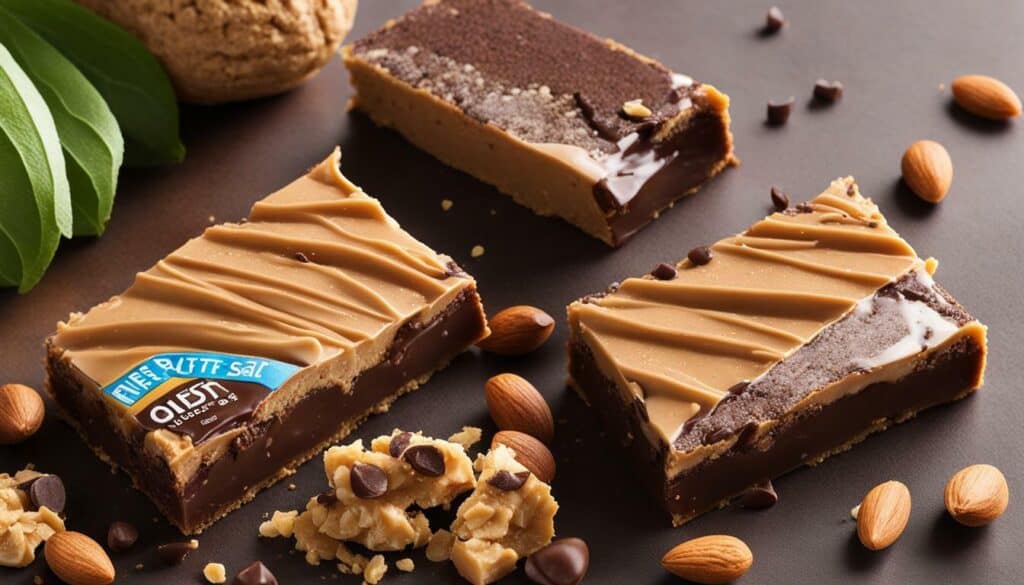
Achieving a well-rounded diet requires balancing macronutrients, and Quest Bars are no exception. Let’s take a closer look at their macronutrient profile.
Each Quest Bar typically contains around 20 grams of protein, making it an excellent protein source for those looking to build or maintain muscle. Protein is essential for repairing and building tissues, supporting immune function, and providing a feeling of satiety after meals. With Quest Bars, you can conveniently increase your protein intake on the go.
In addition to protein, Quest Bars also contain a moderate amount of carbohydrates. The precise amount varies depending on the flavor, but it typically ranges from 20 to 25 grams per bar. These carbohydrates provide a quick source of energy, making Quest Bars a suitable option for pre- or post-workout fuel. However, it’s important to note that if you’re following a low-carb diet, you may want to consider alternative protein bar options.
| Nutrient | Amount per Bar |
|---|---|
| Protein | Approximately 20 grams |
| Carbohydrates | Approximately 20-25 grams |
Fat content in Quest Bars is relatively low, usually ranging from 6 to 9 grams per bar. This makes them a suitable choice for those watching their fat intake or following a lower-fat diet plan. However, it’s worth noting that the specific types of fats used in Quest Bars may vary depending on the flavor. Some flavors may include healthy fats from sources like nuts and seeds, adding nutritional value to the bars.
Remember, while Quest Bars can be a convenient and tasty snack option, they should not replace whole food, home-cooked meals. It’s always recommended to prioritize fresh, whole foods as the foundation of a balanced diet. However, if you’re in a hurry or need a quick protein boost, Quest Bars can be a suitable option to consider.
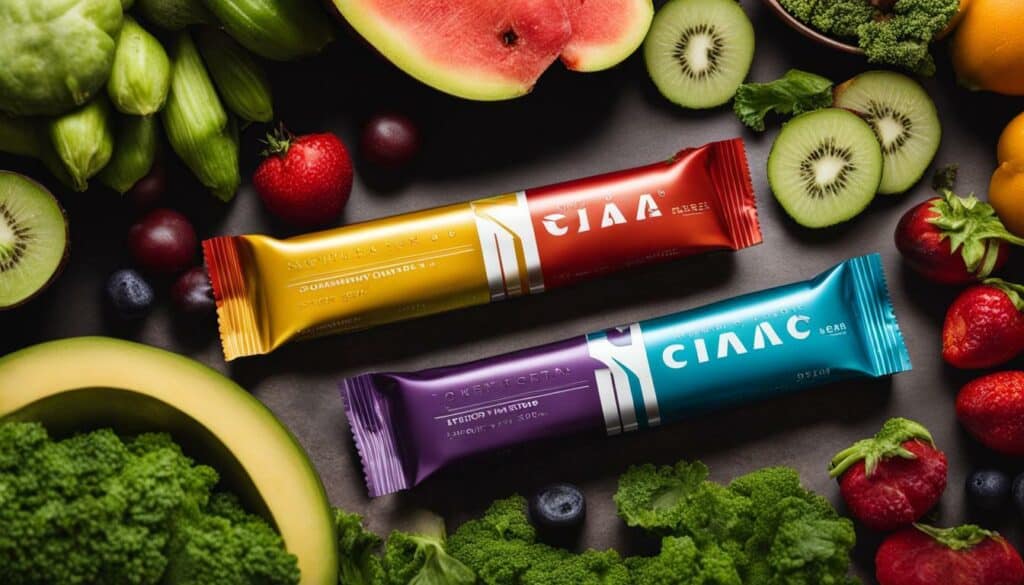
- Quest Bars provide approximately 20 grams of protein per bar, making them a convenient protein source.
- Carbohydrate content in Quest Bars ranges from 20 to 25 grams, providing quick energy.
- Fat content in Quest Bars is relatively low, usually ranging from 6 to 9 grams.
- Quest Bars should not replace whole food, home-cooked meals, but they can be a convenient snack or protein boost when needed.
Remember, everyone’s nutritional needs and preferences differ, so it’s essential to make an informed decision when choosing a protein bar that aligns with your goals and dietary requirements. Whether you decide to enjoy a Quest Bar or explore other options, finding your favorite protein bar is a personal journey that can help support your overall health and well-being.
Quest Protein Bar Nutrition: Power-Packed Protein Content
Protein is a key nutrient for fitness enthusiasts, and Quest Bars are known for their high protein content. Let’s explore the nutritional benefits of the protein found in these bars.
Each Quest Bar contains approximately 20 grams of protein, making it a convenient and effective way to meet your daily protein needs. This high protein content is essential for muscle growth and repair, making Quest Bars a popular choice among athletes and those looking to maintain a healthy lifestyle. Whether you’re hitting the gym or simply need a quick snack on the go, Quest Bars provide a powerful protein punch.
But it’s not just the quantity of protein that matters – it’s the quality as well. Quest Bars are made with high-quality protein sources such as whey protein isolate, which is easily absorbed by the body. This ensures that your muscles are getting the amino acids they need to thrive.
| Nutrient | Amount per serving |
|---|---|
| Calories | 190 |
| Protein | 20g |
| Total Fat | 8g |
| Saturated Fat | 2g |
| Carbohydrates | 22g |
| Fiber | 15g |
| Sugar | 1g |
“Quest Bars are a convenient and delicious way to fuel your body with protein. They offer a balanced macronutrient profile, high fiber content, and a low sugar count, making them suitable for a variety of dietary needs.” – Nutritionist John Lewis
As you can see from the nutritional table above, Quest Bars offer a well-rounded macronutrient profile. The fiber content is particularly noteworthy, with each bar providing 15 grams of fiber. This high fiber content helps promote healthy digestion and can contribute to feelings of fullness, making Quest Bars a satisfying snack option.
While Quest Bars provide a quick and convenient source of protein, it’s important to note that they should not replace whole food, home-cooked meals. Whole foods offer a wider range of nutrients and benefits that cannot be replicated by protein bars alone. Nutrition experts generally recommend opting for whole-food-based options whenever possible.
When it comes to choosing a protein bar, it ultimately comes down to personal preference and nutritional needs. While Quest Bars have their advantages, there are also other brands and options available. It’s important to make an informed decision and choose a protein bar that aligns with your goals and tastes.
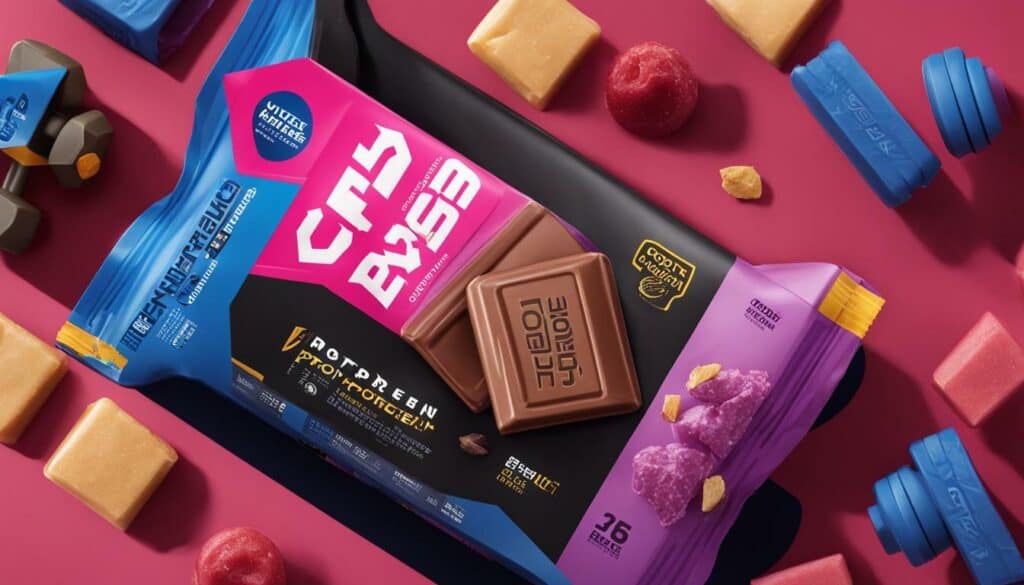
When it comes to protein bars, Quest Bars are known for their high protein content. Each bar contains approximately 20 grams of protein, providing a substantial boost for muscle growth and recovery.
- The protein in Quest Bars is sourced from high-quality ingredients like whey protein isolate, which is easily absorbed by the body.
- This ensures that your muscles receive the essential amino acids they need to support optimal performance.
- Whether you’re an athlete or simply leading an active lifestyle, the protein in Quest Bars can help you reach your fitness goals.
So, why is protein so important? Protein plays a crucial role in muscle repair, building lean muscle mass, and supporting overall health. It also helps keep you feeling fuller for longer, reducing the likelihood of snacking on unhealthy options between meals.
While Quest Bars offer a convenient protein source, it’s important to remember that they should not replace whole, nutritious meals. They can, however, be a valuable addition to your diet, providing a quick and satisfying protein boost when you need it most.
Ultimately, it’s up to you to decide which protein bar aligns with your nutritional goals and preferences. The key is to make informed choices and listen to your body’s needs. So go ahead, grab a Quest Bar, and enjoy the benefits of a protein-packed snack!
“Protein is essential for muscle growth and repair, and Quest Bars provide a convenient and delicious way to fuel your body with this vital nutrient.” – Fitness trainer Emma Taylor
Remember to consult with a healthcare professional or registered dietitian before making any significant changes to your diet or if you have specific dietary requirements or restrictions.
Uncovering Quest Bar Allergen Information
If you have food allergies or follow a specific dietary plan, it’s crucial to be aware of the allergens present in Quest Bars. Let’s uncover this allergen information.
Quest Bars are known for their wide range of flavors and convenient on-the-go nutrition. However, it’s important to note that these bars may contain allergens that could potentially trigger an allergic reaction or interfere with your dietary restrictions.
According to the official Quest Nutrition website, Quest Bars may contain allergens such as milk, soy, peanuts, tree nuts, eggs, and wheat. It’s essential to carefully read the ingredient list and allergen information on the packaging before consuming Quest Bars.
To ensure your safety and well-being, it’s recommended to consult with a healthcare professional or registered dietitian if you have specific food allergies or dietary restrictions. They can provide personalized guidance and help you make informed decisions about whether Quest Bars are suitable for your needs.
Quest Bar Allergen Information Table
| Allergen | Potential Presence in Quest Bars |
|---|---|
| Milk | Yes |
| Soy | Yes |
| Peanuts | Yes |
| Tree Nuts | Yes |
| Eggs | Yes |
| Wheat | Yes |
Remember, it’s always essential to prioritize your health and well-being. If you have food allergies or follow a specific dietary plan, consider exploring alternative protein bar options that align with your needs.
Before making any changes to your diet, consult with a healthcare professional or registered dietitian who can provide personalized advice based on your specific requirements. They can help you navigate the world of protein bars and find the best options for your overall health and wellness.

Sugar intake is a hot topic when it comes to nutrition, so let’s explore the sugar content of Quest Bars and how it aligns with your health goals. Quest Bars are known for their delicious taste and high protein content, but it’s important to consider the sugar content as well.
When examining the nutritional label of Quest Bars, you’ll notice that they contain around 1-3 grams of sugar per bar, depending on the flavor. Compared to traditional candy bars and other sweet snacks, this may seem like a favorable option for those watching their sugar intake.
However, it’s crucial to be mindful of the type of sweeteners used in Quest Bars. They are made with three high-intensity sweeteners: sucralose, stevia, and erythritol. While these sweeteners are low in calories and do not lead to an immediate spike in blood sugar, some individuals may find that consuming these artificial sweeteners can trigger cravings for more sweets.
Table: Quest Bar Sugar Content Comparison
| Flavor | Sugar Content (g) |
|---|---|
| Chocolate Chip Cookie Dough | 1g |
| Double Chocolate Chunk | 2g |
| Cookie Dough Chunk | 3g |
“Quest Bars contain artificial sweeteners, which may contribute to cravings for more sweets.”
While Quest Bars can be a convenient and tasty option for on-the-go snacking or post-workout fuel, they should not be relied upon as a replacement for a whole food, home-cooked meal. Nutrition experts generally do not recommend Quest Bars to their clients, as they are highly processed and contain artificial ingredients.
When it comes to choosing a protein bar, it’s important to consider more whole-food-based options that provide a balance of nutrients and are made with minimal, natural ingredients. Additionally, it’s always a good idea to consult with a healthcare professional or registered dietitian to determine the best protein bar choice for your individual needs and goals.
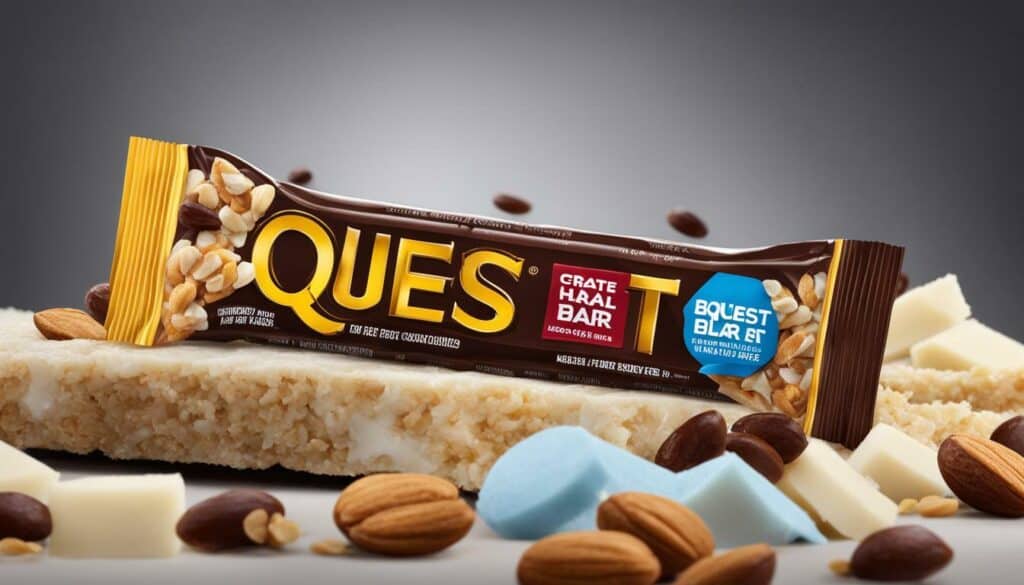
Fiber is an essential part of a healthy diet, but excessive intake can lead to bloating. Let’s explore the fiber content of Quest Bars and its effects on your digestive system.
Quest Bars are known for their high fiber content, which can vary depending on the flavor. On average, each bar contains around 12-17 grams of fiber. This significant amount of fiber can have both positive and negative impacts on your digestion.
When consumed in moderation, fiber helps promote a healthy digestive system by aiding regular bowel movements and preventing constipation. It can also contribute to a feeling of fullness, which may be beneficial for those looking to manage their weight or reduce snacking between meals.
However, it’s important to note that a sudden increase in fiber intake, especially from highly processed sources like Quest Bars, can cause bloating and discomfort. This is because the body needs time to adjust to the increased fiber load, and insufficient water intake can exacerbate these symptoms. It’s recommended to increase fiber intake gradually and drink plenty of water throughout the day to minimize bloating.
| Flavor | Fiber Content per Bar |
|---|---|
| Chocolate Chip Cookie Dough | 17g |
| Cookies and Cream | 14g |
| Mint Chocolate Chunk | 13g |
| White Chocolate Raspberry | 12g |
It’s important to listen to your body and find a balance that works for you. If you experience discomfort or excessive bloating after consuming Quest Bars or any other high-fiber food, it may be beneficial to explore alternative protein bar options with lower fiber content. Always consult with a healthcare professional or registered dietitian for personalized advice.
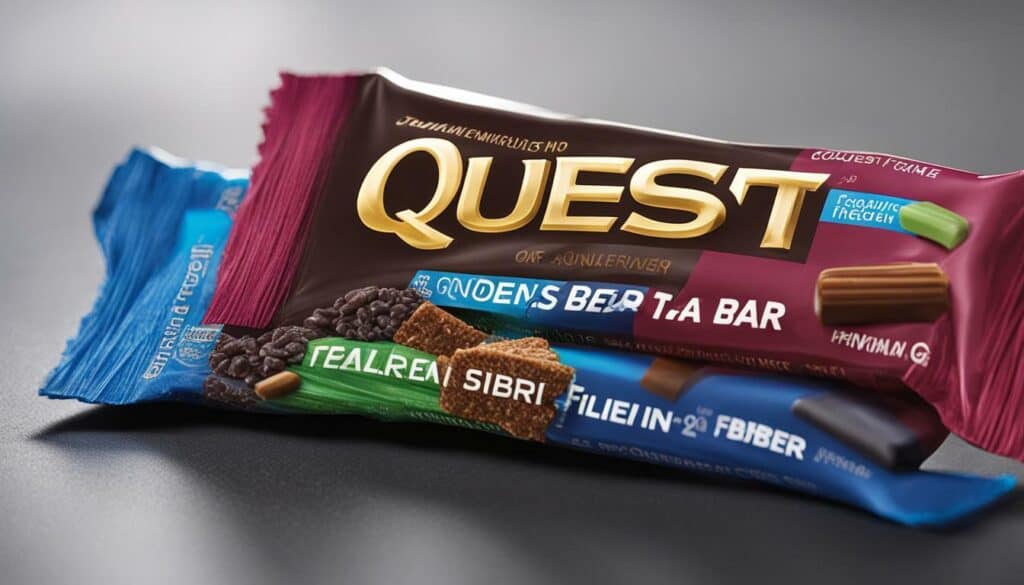
- Fresh fruits like raspberries or bananas
- Nuts and seeds
- Yogurt or kefir
Remember, finding the right balance of fiber in your diet is essential for a healthy digestive system. Don’t hesitate to experiment with different protein bar options and whole foods to discover what works best for your body.
The Quest Bar Alternative: Kirkland Brand at Costco
Looking for a more cost-effective alternative to Quest Bars? Let’s discover the Kirkland brand at Costco, a high-quality option with a comparable nutritional profile. While Quest Bars have gained popularity as a convenient protein bar option, there has been ongoing debate about their nutritional value. With highly processed ingredients and three high-intensity sweeteners, some nutrition experts caution that Quest Bars may lead to cravings for more sweets.
Moreover, Quest Bars’ high fiber content could potentially cause bloating, making them less suitable for those with sensitive stomachs. As a result, nutrition experts do not typically recommend Quest Bars as a replacement for whole food, home-cooked meals. Instead, they suggest opting for more whole-food-based options to meet your nutritional needs.
However, if you enjoy the convenience and flavors of Quest Bars, the Kirkland brand at Costco offers a budget-friendly alternative. These bars have a similar nutritional profile to Quest Bars but come at a lower price point. The Kirkland brand also offers a range of flavors and forms, including mini bars, chips, cookies, and shakes, providing variety to suit different tastes.
| Brand | Price per bar | Protein content (g) | Sugar content (g) | Fiber content (g) |
|---|---|---|---|---|
| Quest Bars | $2.50 | 20 | 1 | 15 |
| Kirkland Brand at Costco | $1.50 | 21 | 2 | 14 |
When making a decision about the protein bars that best suit your needs, it’s essential to consider both cost and nutritional value. The Kirkland brand at Costco provides a budget-friendly option without compromising on the key nutritional components found in Quest Bars.
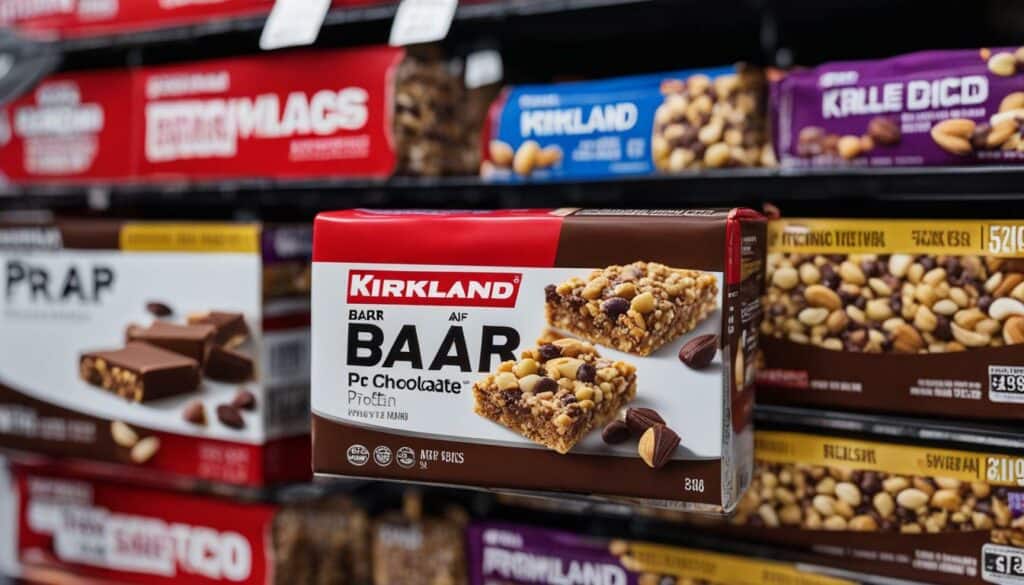
Remember, the choice of your favorite protein bar may vary from person to person. It’s crucial to consider your individual dietary preferences and goals when selecting the right option for you. Whether it’s Quest Bars or the Kirkland brand at Costco, making an informed decision will help you enjoy a delicious protein-packed snack that aligns with your overall nutritional needs.
Making an Informed Decision: Choosing Your Protein Bar
With a myriad of protein bar options available, it can be challenging to find the perfect fit for your nutritional goals. Let’s explore factors to consider when making an informed decision.
1. Ingredients: Start by examining the ingredient list. Look for bars that contain whole-food ingredients and avoid those with excessive additives or preservatives. Opting for bars with natural sweeteners like dates or honey can also be a healthier choice.
2. Nutritional Profile: Take a close look at the nutrition facts panel. Consider the protein content, fiber, and sugar levels. It’s generally recommended to choose bars that have at least 15 grams of protein, less than 5 grams of sugar, and a moderate amount of fiber to keep you feeling satisfied.
3. Taste and Texture: Personal preference plays a significant role in enjoying a protein bar. Consider the flavors, textures, and overall taste experience. Many brands offer sample packs or smaller sizes, allowing you to try different options before committing to a larger purchase.
Expert Quote:
“When choosing a protein bar, it’s important to prioritize ingredients and nutritional content. Look for bars that are made with real food ingredients and have a balanced macronutrient profile. Remember, a protein bar should supplement your diet, not replace whole food meals.”
4. Cost: Evaluate the cost per bar and compare it to your budget. While some bars may seem more expensive upfront, consider the value they provide in terms of nutrition and satisfaction. Keep in mind that protein bars can be a cost-effective option when used as a meal replacement or snack.
5. Brand Reputation: Research the brand behind the protein bar. Look for companies that prioritize transparency, quality, and sustainability. Checking customer reviews and seeking recommendations from trusted sources can also give you insights into the reputation and reliability of different brands.
Remember, choosing a protein bar is a personal decision that should align with your individual needs and preferences. By considering these factors, you’ll be able to find a protein bar that not only supports your nutritional goals but also satisfies your taste buds.
| Criteria | Considerations |
|---|---|
| Ingredients | Whole-food ingredients, natural sweeteners |
| Nutritional Profile | High protein, low sugar, moderate fiber |
| Taste and Texture | Flavors, textures, personal preference |
| Cost | Value for money, cost per bar |
| Brand Reputation | Transparency, quality, sustainability |

In the quest for a delicious and healthy protein bar, the ultimate goal is to find your favorite. Remember, everyone’s tastes and nutritional needs vary, so embrace the journey to discovering the perfect protein bar for you.
When it comes to protein bars, there are countless options available on the market. From the popular Quest Bars to other brands offering a variety of flavors and textures, the choices can be overwhelming. But fear not, with a little experimentation and some insight into your personal preferences, you’ll soon find the protein bar that meets all your requirements.
Consider factors such as taste, texture, ingredients, and nutritional content. Some people prefer a bar with a soft and chewy texture, while others enjoy a crunchy and crispy bite. Pay attention to the flavors you enjoy the most, whether it’s chocolatey, fruity, or nutty.
Additionally, take into account the nutritional composition of the protein bar. Look for a balance of macronutrients such as protein, carbohydrates, and healthy fats that align with your dietary goals. Some bars may be higher in protein content, while others may have lower sugar or calorie levels. Remember to focus on whole food-based options that include natural and minimally processed ingredients for optimal nutrition.
Finally, don’t be afraid to try different brands and flavors until you find your favorite protein bar. Quest Bars may be a popular choice, but they may not be suitable for everyone due to their highly processed ingredients and sweeteners. Explore alternatives such as the Kirkland brand at Costco, which offers a similar nutritional profile at a more affordable price.
In conclusion, finding your favorite protein bar is a personal journey that involves experimenting with different brands, flavors, and nutritional compositions. Trust your taste buds, listen to your body’s needs, and make an informed decision based on what works best for you. Remember, there is a perfect protein bar out there waiting for you to discover it!
FAQ
Q: Are Quest bars a healthy protein bar option?
A: Nutrition experts do not recommend Quest bars as a replacement for a whole food, home-cooked meal. While they may be convenient, the bars contain highly processed ingredients, three high-intensity sweeteners, and may lead to cravings for more sweets.
Q: Can Quest bars cause bloating?
A: The high fiber content in Quest bars could potentially cause bloating in some individuals.
Q: What do nutrition experts recommend instead of Quest bars?
A: Nutrition experts suggest opting for more whole-food-based protein bar options instead of Quest bars.
Q: What forms do Quest bars come in?
A: Quest bars are available in various forms such as mini bars, chips, cookies, and shakes.
Q: Are there any cheaper alternatives to Quest bars?
A: The Kirkland brand at Costco offers a similar version of Quest bars that are cheaper and have similar nutritional profiles.
Q: How can I make an informed decision when choosing a protein bar?
A: It is important to consider your preferences and needs when choosing a protein bar. Factors such as nutritional content, ingredients, and taste should be taken into account.
Q: What is the favorite protein bar varies from person to person?
A: The favorite protein bar can vary from person to person, as individual tastes and dietary needs differ.
How Does Spangles Nutritional Information Compare to Quest Bar Nutrition Information?
When comparing spangles nutritional information to Quest Bar nutrition information, differences are evident. While Spangles offers a variety of options, including burgers and milkshakes, Quest Bars are protein-packed snacks. Both provide nutritional labels to help consumers make informed choices, but the nutritional values may vary based on individual products.





Leave a Reply